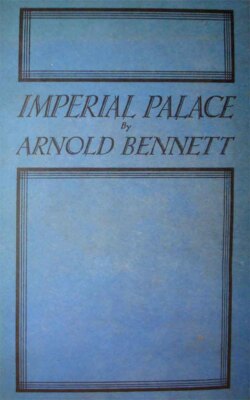Читать книгу Imperial Palace - Arnold Bennett - Страница 48
На сайте Литреса книга снята с продажи.
Chapter XXII – THE RESOLUTION
ОглавлениеI
In calling upon Evelyn to move the Resolution which was the sole reason for the Special General Meeting, father Dennis hoarsely and squeakily murmured:
“The meeting will I hope pardon me if I refer to a purely personal matter. I am suffering to-day from rather serious throat-trouble, and my medical adviser, in whom I have as much confidence as a sane man can have in a medical adviser, insisted that I should make only one speech—and that as short as possible,” he added with a roguish old smile.
Titters of laughter, which were, however, sympathetic. Every year the Chairman thus mentioned his throat, as though the malady had but quite recently supervened.
Evelyn did not wholly regret the sad state of the Chairman’s throat, because in practice it raised himself from second-fiddle to first-fiddle at the annual gatherings. Also the nervousness which had beset him in his speech at the Ordinary Meeting was now completely dissipated in exciting emotion. Let none imagine that the moving of a Resolution at a Special General Meeting of the shareholders of a limited liability company cannot be emotional. Liability may be limited by Act of Parliament, but not emotion—neither drama.
The shareholders were fully acquainted with the terms of the startling Resolution, but Evelyn began by reading it in tones which almost justified the Chairman’s description of him as an orator. The Resolution provided that instead of having one vote per share, each shareholder should have only one vote per five shares. And further that no shareholder, no matter how large his holding of shares, should have a total of more than ten votes. He pointed out that obviously the Resolution gave an advantage to the small shareholder, since a holder of fifty shares would wield the same voting power as a holder of fifty thousand shares. And he pointed out that, as the Chairman of the Board happened to be the largest shareholder in the Company, the Board could not be accused of an attempt to favour its own individual interests at the expense of any other shareholders.
Then he spoke very vaguely of the possibility of foreign interference in the destinies of the Company. He made no accusation. Oh no! He spoke of a mere possibility—but a possibility against which, if the shareholders in their wisdom agreed, it might be advisable to protect the Company. Were the shareholders prepared to allow the control of a British company to pass out of British hands? If so, well and good. If not, the Resolution was the surest safeguard, the only real safeguard, against such a contingency—a contingency which, he ventured to think, was of a most sinister nature. The shareholders, who were doubtless thoroughly acquainted with all the phenomena of industry and finance, had of course noticed in past months that foreign interests had been ousting British interests in various very important British undertakings. He would not assert that any scheme was definitely afoot for getting control of the Imperial Palace Hotel Company. He would be content to say that in the last couple of years, and especially in the last few months, blocks of shares had changed hands, and transfers had been registered, in a manner calculated to arouse the suspicions, but no more than the suspicions, of a watchful Board. The Board had desired the attendance of their good friend Mr. Levinsohn, who had acted with signal success for many years as solicitor to the Company. He, the speaker, could not pretend to Mr. Levinsohn’s unique authority in company affairs, and Mr. Levinsohn would give the shareholders his valuable views on the subject before them. Confessing that his own feelings as to the proper course to be followed for the welfare of the Company were both clear and deep, and then formally moving the Resolution, Evelyn sat down.
Certainly he had shown some emotion, some sense of the drama of the occasion. But his clear and deep feelings, though he might not have admitted the fact even to himself, were due less to a regard for the welfare of the Imperial Palace Hotel Company than to the risk of his life-work and his career being imperilled by the substitution of any other Board for the Board which while nominally his master was really his tool.
Evelyn’s heart knocked against his waistcoat, but its beat was strong and regular. He was nervous again; his glance flitted nervously about the banqueting chamber, in which the sobriety of the green-topped table contrasted so strangely with the glory of the chandeliers, the brightness of the decorated walls and the gaiety of the chairs.
Ruffo peeped cautiously in through the double service-doors, and the doors slowly and silently shut him out of sight.
Father Dennis’s face had an expression of bland, negligent cynicism. Lingmell’s bloated, wise features were calm and absorbed in his everlasting dream of fleshly satisfactions. These two old men were still incapable of excitement. The two younger directors were employed in subduing their fever into an imitation of tranquillity. Evelyn understood them, but he doubted whether they understood him. He was too far above them in attainments and position to be fully understood by them. They might work hard; they might display a heroical loyalty; but never could they reach his height, for they had not his qualities. He felt sorry for them; for either their ambitions were humble or their ambitions would be disappointed. The future king of the world of hotels was not on the Imperial Palace Board; perhaps he was hidden somewhere in the upper-staff.
The shareholders, stiff on their festive chairs, were grim, unresponsive, waiting, flinty-souled.
